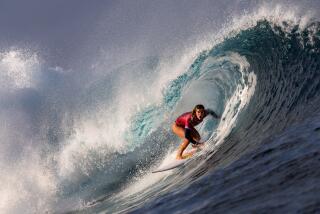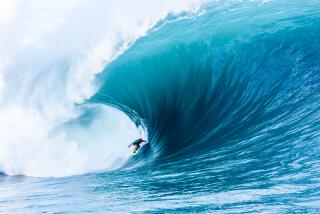He Finds Beach Volleyball Is More Fun to Play Than to Promote
- Share via
Now, almost a year later, David Wilk smiles as he recalls the trials and tribulations of last summer.
He leans back in his comfortable, Huntington Beach office and says that his life is simpler, much more leisurely, without professional beach volleyball. There is no more of the constant hassle with players, no more flying across country to promote tournaments. He has time to spend at home in San Clemente with his wife and two sons.
But that doesn’t mean Wilk has given up on making a profit in the sand.
Wilk’s new venture, Surfline, is a 24-hour telephone information service that gives surfers a 90-second recording with regularly updated information on wave conditions at 24 beaches from Ventura to Huntington Beach.
Part of Pacific Telephone’s new 976-Information Access Service, the call to 976-SURF costs callers 55 cents, of which Surfline gets 31 cents. Just 2 1/2 months since it began, Surfline is averaging 2,000 calls a day, Wilk said.
“We haven’t done much advertising, so it’s really building on word-of-mouth right now,” he said. “It’s gratifying that it’s growing so fast.”
Wilk and his business partner for the last 10 years, Craig Masuoka, came up with the idea for Surfline last summer, as they realized that their days in beach volleyball were numbered. Surfers had told them that the only surf reports available--radio news, newspaper weather forecasts and telephone recordings at a handful of lifeguard stations--did not give specific enough information about wave conditions and were often unreliable.
So the two businessmen worked with Surfing magazine to set up a network of beach reporters, mostly members of the National Scholastic Surfing Assn. Each reporter is responsible for the three or four beaches he regularly surfs. The reporters call in three times a day with a report that includes such specific surfing information as wave condition, type and shape, face height, wind conditions, swell, weather and crowd conditions.
“The guys who do the reporting are expert surfers and know what surfers want to know,” Wilk said. “And they know their home beaches. They know if it will get better later in the day or worse. That’s the real advantage.”
There are three messages a day, at 6:30 a.m., noon and 4:30 p.m., and a three-day forecast at 7:30 p.m. Beach Boys music is played in the background of the taped message, which uses surfer lingo in reporting that, at one beach, there are “lined-up peaks, both lefts and rights” or “fun reforms inside,” but the crowds are a “zoo.”
Surfers in Redondo, Manhattan and Hermosa beaches said they found Surfline to be accurate and helpful.
“I used to use some radio reports or the offshore forecast in the newspaper. Plus I live on the beach, so I could get up on the roof and look out at the ocean, but it’s still just a guess. (Surfline) breaks down every beach.” said Kevin Watkins, of Hermosa Beach. “The only problem is that now, any idiot can get to the right beach. It takes the advantage away from the seasoned surfer.’
“Now, any kid in Reseda knows as much as the guy living on the beach.”
Next week, Surfline will begin in San Diego County, reporting on beaches from San Clemente to the border, Wilk said. He hopes to expand to Orange County by the end of the summer, then to Northern California, Florida and Hawaii by next year. Wilk also talks of a future Skiline and the possibility of promoting surfing competitions.
“I’m very excited about Surfline. This is a more consumer-oriented business, it’s easier to control with business principles,” Wilk said. “Plus I can come to work in shorts--no more three-piece suits.”
And, Wilk said, the new business leaves him time for his favorite recreation--playing volleyball on the beach.



